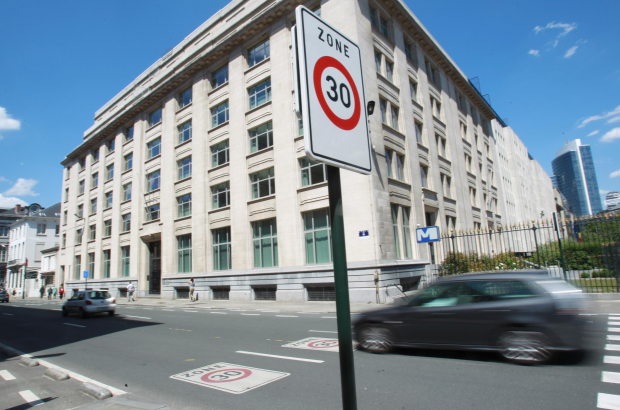- Daily & Weekly newsletters
- Buy & download The Bulletin
- Comment on our articles
Report shows Zone 30 having a positive effect on road safety in Brussels
Serious accidents and deaths are down 25% in Brussels due to the implementation of the Zone 30 generalised speed limit areas in the city, which came into force on 1 January.
That’s according to a report on the first six months of Zone 30, released on Tuesday by Brussels Mobility. The reduction of the speed limit from 50 km/h to 30 km/h has also halved noise pollution from road traffic, the report stated.
Brussels Mobility recorded 1,550 accidents during the first six months of 2021, compared to 1,826 on average in the last five years, a decrease of about 25% in the combined number of serious injuries and deaths. In the first half of the year, four people died (compared to an average of 6.8 between 2016 and 2020) and 61 were seriously injured (compared to 81) on the roads of the capital.
However, making a correct comparison remains difficult due to the effects on traffic from the ongoing coronavirus pandemic. Compared to the same period in 2020, when there was a major shutdown in Brussels, the number of accidents has actually increased. And the level of traffic today is still not quite at the level it was before the pandemic hit.
According to the new report, the number of injured cyclists has increased: 543 in the first half of 2021, compared to an average of 389 over the past five years. However, this increase should be put in perspective with "the explosion in the number of new cyclists in the last two years in Brussels," Brussels Mobility said in a statement.
Going from 50 km/h to 30 km/h has also halved noise pollution from road traffic, between 2.5 and 3.9 dB(A) depending on the type of surface, the organisation noted.
"Noise, mainly related to road transport, has a significant impact on our health," the regional environment minister, Alain Maron, was quoted as saying in the Brussels Mobility statement. "Calming traffic is a key element in improving the quality of life for residents and Zone 30 is an important tool to achieve this."
If it is still an interim evaluation, "during a particular period", "we are starting to see that City 30 is bearing fruit," according to the Brussels mobility minister Elke Van den Brandt. She added that "there will still be a lot of work to do in the coming months and years."
Zone 30 initiatives are becoming increasingly popular in cities across Europe. Paris introduced a speed limit of 30 km/h on almost all streets from the start of this week while other French cities such as Grenoble, Nantes, and Rennes have already taken the step. Next year, Amsterdam, which explicitly refers to taking its the inspiration from Brussels, also wants to introduce a generalised Zone 30.

















Comments
Yes. Reducing the speed limit to 30 km/h on major highways would also have a positive effects on road safety, but that doesn't mean we should do it...
Yes I completely agree with what Frank just commented and of course the zone 30 could be reduced to zone 20 or zone 10 and then we’d have even fewer accidents. But life is a compromise between 100% safety and actually doing something. In this case I think 30 km/h (which means most people will drive 40+) it’s a good thing. What I’d like to see more of is people using their turn indicators in traffic circles / roundabouts. In the last 30 years living in Belgium the quality of driving (also in Germany) has really gone down. Not as bad as the US where no one knows how to drive and passes on the right but still declining. Too much reliance on airbags I think…